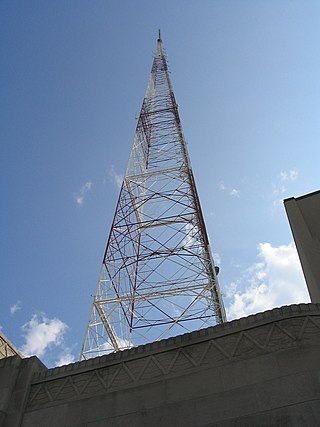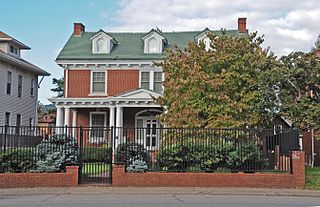
Huntington is a city in Cabell and Wayne counties in the U.S. state of West Virginia. The seat of Cabell County, the city is located in SW West Virginia at the confluence of the Ohio and Guyandotte rivers. Huntington is the second-most populous city in West Virginia, with a population of 46,842 as of the 2020 census. Its metro area, the Huntington–Ashland metropolitan area, is the largest in West Virginia, spanning seven counties across three states and having a population of 376,155 at the 2020 census.

Lyon Village is a neighborhood and urban village in Arlington County, Virginia, along Langston Boulevard. It adjoins Arlington County's government center, and is approximately one mile west of Rosslyn and less than a mile north of Clarendon, of which it is sometimes considered a sub-neighborhood, as is Cherrydale, the mostly residential district immediately west of Lyon Village.

The Washington Park Historic District is a national historic district located in Indianapolis, Indiana. It was listed on the National Register of Historic Places on June 24, 2008. It comprises nearly 60 acres (240,000 m2) and is located 4 miles (6.4 km) north of downtown Indianapolis, in the south-central part of the Meridian-Kessler neighborhood. The district includes all properties south of 43rd Street and north of 40th Street, and west of Central Avenue and east of the alley running north and south between Pennsylvania and Meridian Streets; Washington Boulevard runs north-south through the center of the district. It includes 110 contributing buildings, ranging mostly from mansions to small bungalows, and three non-contributing buildings.

Shinnston Historic District is a national historic district located at the confluence of the West Fork River and Shinn's Run, Shinnston, Harrison County, West Virginia.
Virginian Railway Yard Historic District is a national historic district located at Princeton, Mercer County, West Virginia. The district includes 14 contributing buildings, 1 contributing site, and 1 contributing structure related to the Virginian Railway property at Princeton. Many date to the founding of the railway in 1905–1909, with others related to a physical improvements campaign in the 1920s. A number of the buildings are a vernacular interpretation of the Romanesque Revival style. They include the Locomotive Erecting Shop, transfer table pit, machine shop foundations, three water pump houses, North Repair Shop, Brick Storehouse, and Car Wheel Shop.

The Downtown Morgantown Historic District is a federally designated historic district in Morgantown, Monongalia County, West Virginia. The district, encompassing approximately 75 acres, has 122 contributing buildings and 2 contributing sites including commercial and public buildings, residences, and churches. The district has been listed on the National Register of Historic Places since May 2, 1996. Ten of the contributing buildings are listed separately on the National Register of Historic Places. Significant structures located within the historic district are the Monongalia County Courthouse, the Metropolitan Theater, and the Old Morgantown Post Office.

East Wheeling Historic District is a national historic district located at Wheeling, Ohio County, West Virginia. The district encompasses 300 contributing buildings and one contributing site, including the Monroe Street East Historic District. The district is primarily residential, developed in the late-19th and early-20th century. A number of popular architectural styles are represented including Greek Revival and Gothic Revival. Notable non-residential buildings include St. Joseph Cathedral (1926), former Hazel Atlas Company building, Scottish Rite Temple designed by noted Wheeling architect Frederick F. Faris (1870-1927), Elks Building, and YMCA (1906), also designed by Faris. The contributing site is Elk Playground. Also located in the district are the separately listed L. S. Good House, Charles W. Russell House, and Cathedral Parish School.

Woodsdale–Edgewood Neighborhood Historic District is a national historic district located at Wheeling, Ohio County, West Virginia. The district encompasses 969 contributing buildings and is primarily residential, developed between 1888 and 1945. A number of popular architectural styles are represented including Shingle Style, Queen Anne, Tudor Revival, American Foursquare, Colonial Revival and Bungalow style. The district also includes four Lustron houses. Notable non-residential buildings include the Edgwood Christian Mission Alliance Church (1932), St. John's Episcopal Chapel (1913), Mount Carmel Monastery (1915) designed by Frederick F. Faris (1870-1927), and Good Shepherd Home (1912). Also located in the district are the separately listed H. C. Ogden House and William Miles Tiernan House.

Colonial Village is a historic garden apartment complex located at Arlington County, Virginia, United States. It contains 226 contributing buildings built in four stages between 1935 and 1940. The buildings hold approximately 1,055 apartments. The brick Colonial Revival-style buildings are situated around courtyards with clusters of five and seven buildings to larger groupings of up to thirteen. Colonial Village was the first Federal Housing Administration-insured, large-scale, rental housing project erected in the United States. The complex has been converted to condominiums split into three phases and two apartment complexes: Colonial Village Apartments and Colonial Village West.

Petersburg Courthouse Historic District is a national historic district located at Petersburg, Virginia. The district includes 75 contributing buildings located in the central business district of Petersburg. It is centered on the Petersburg Courthouse and includes notable examples of Greek Revival, Italianate, Federal style architecture. Notable buildings include the Paul-Lassiter House, Slaughter-Tatum House, Tabb Street Presbyterian Church Rectory, Mark E. Holt Jewelry Store, Augustus Wright Block, Virginia National Bank, Saal's Department Store, Remmie Arnold Pens Company building, A&P Super Market, Watson Court Apartments, and the Zimmer & Company Building. Located in the district and separately listed are the Petersburg City Hall, Tabb Street Presbyterian Church, and Saint Paul's Church.

The West Franklin Street Historic District is a national historic district located at Richmond, Virginia. It is located along the northern boundary of the Fan district. The district encompasses 71 contributing buildings built between about 1870 and the 1920. It was originally developed as a primarily residential district with buildings in a variety of popular late-19th and early-20th century architectural styles including Greek Revival, Romanesque, Georgian Revival, Queen Anne, and Italianate. Many of the dwellings have been converted to commercial use. In addition, the district's private houses have been converted into multi-family housing and departmental offices for Virginia Commonwealth University. Notable buildings include Franklin Terrace, the Ritter-Hickock House, First Independent Church, Founder's Hall, the Raleigh Building, The Greyston Apartments, Gresham Court Apartments, and the Beth Ahabah Congregation Hall and Synagogue.

The Scott's Addition Historic District is a national historic district located in Richmond, Virginia.

Suffolk Historic District is a national historic district located at Suffolk, Virginia. The district encompasses 514 contributing buildings, 3 contributing structures, and 3 contributing objects in Suffolk. The district includes a variety of residential, commercial, governmental, and institutional buildings. They are in a variety of vernacular and popular 19th and 20th century architectural styles including Greek Revival, Queen Anne, and Bungalow. Notable buildings include the Allmond Building (1914), Macedonia A.M.E. Church, National Bank of Suffolk (1914-1920), the Old Post Office, old Nansemond County Courthouse, John Granberry house, Richard Seth Eley House (1878), Jones Building, Suffolk Towers, Virginia Apartments (1918-1920), Causey-Kendrick house (1882), Masonic Hall (1911), Suffolk High School (1922), Jefferson High School (1911), old Methodist Church (1861), St. Paul's Episcopal Church (1895), Suffolk Christian Church (1893), and Congregation of Agudath Achin. Located in the district are the separately listed Phoenix Bank of Nansemond, Professional Building, and Riddick House.

Luna Park Historic District is a federally designated national historic district located in the West Side neighborhood of Charleston, Kanawha County, West Virginia. It encompasses 444 contributing buildings in a predominantly residential section of Charleston. The majority of the homes in the district were constructed in the mid to late 1925s and early 1930s and a portion of the district was the location of a local amusement park, Luna Park, from 1912 until 1923. The houses reflect a variety of popular architectural styles including American Foursquare, American Craftsman / Bungalow, Tudor Revival, and Colonial Revival, including Dutch Colonial Revival.

North Washington Street Historic District is a national historic district located in the city of Bloomington of Monroe County, Indiana. The district encompasses 35 contributing buildings and 6 contributing structures in a predominantly residential section of Bloomington. It developed between roughly 1870 and 1929, and includes notable examples of Queen Anne, Classical Revival, and Bungalow/American Craftsman style architecture. Located in the district is the separately listed Morgan House. Other notable buildings include the Showers-Graham House, Showers-Myers House, Teter House, and Washington Terrace Apartments (1929).
Elmwood Historic District–East is a national historic district located at Buffalo, Erie County, New York. The district encompasses 2,405 contributing buildings, 31 contributing structures, and 14 contributing objects in the Elmwood Village neighborhood of Buffalo. It is bounded on the north by Delaware Park, Forest Lawn Cemetery, and the former Buffalo State Asylum, on the south by the Allentown Historic District, and on the west by the Elmwood Historic District–West. This predominantly residential district developed between about 1867 and 1965, and includes notable examples of Queen Anne, Shingle Style, Colonial Revival, Tudor Revival, and American Craftsman style architecture. The district contains one of the most intact collections of built resources from turn of the 20th century in the city of Buffalo and western New York State. Located in the district are 17 previously listed contributing resources including the Buffalo Seminary, Garret Club, James and Fanny How House, Edgar W. Howell House, Edwin M. and Emily S. Johnston House, Col. William Kelly House, Lafayette Avenue Presbyterian Church, Parke Apartments, and the Unitarian Universalist Church of Buffalo. Other notable building include the Frank Lloyd Wright designed William R. Heath House (1904-1905), Herbert H. Hewitt House, School 56 (1910-1911), the Harlow House, A. Conger Goodyear house, Alexander Main Curtiss House, Nardin Academy campus, and Coatsworth House (1897).

Cathedral Hill Historic District is a national historic district located at St. Joseph, Missouri. The district encompasses 309 contributing buildings, 1 contributing site, and contributing structures in a predominantly residential section of St. Joseph. It developed between about 1860 and 1950, and includes representative examples of Greek Revival, Italianate, Queen Anne, Colonial Revival, and American Craftsman style architecture. Located in the district is the separately listed Virginia Flats. Other notable buildings include the Nisen Stone House, Thomas Culligan House, A. D. Hudnutt House (1909), St. Joseph Cathedral (1877), James Wall House, Taylor Apartments, E. F. Weitheimer House (1888), Sarah and Ann Walsh Apartment House (1915), Henry Owen Stable (1898), George T. Hoagland Speculative House (1901), and James Hull House (1887).

President's House, historically known as Campbell-Staats House, is a historic home located next to the Campbell House in the Ritter Park Historic District in Huntington, West Virginia.

The Cammack House, is a historic home located next to the Campbell House, in the Ritter Park Historic District in Huntington, West Virginia.

The Campbell House, is a historic home located between the Cammack House and the Campbell-Staats House in the Ritter Park Historic District in Huntington, West Virginia.





















